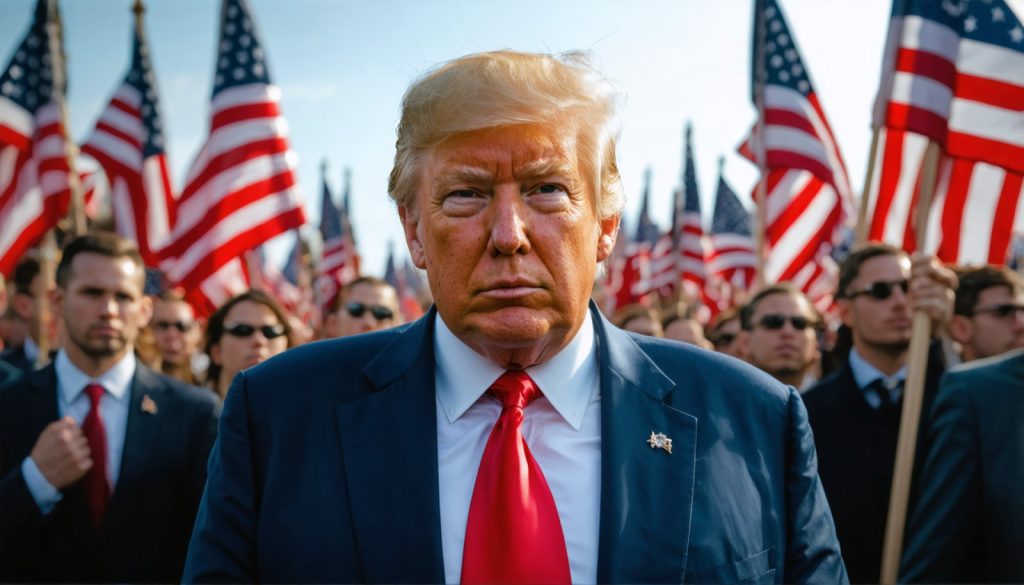
- President Trump announced surprising tariffs targeting unusual regions, causing global market turmoil and drawing comparisons to past economic shocks.
- Speculation arises over the motives and influences behind the tariffs, with theories ranging from advanced AI involvement to strategic economic maneuvers.
- Technology and AI leaders see opportunity in crisis, suggesting innovation can help businesses adapt and thrive despite tariff-induced challenges.
- Tariffs pressure the tech and retail sectors, prompting strategic pivots to handle new cross-border complexities and financial strains.
- The move removes the low-value exemption for goods under $800, impacting online retail giants like Shein and Temu.
- Cryptocurrency may gain appeal as a safe haven amidst fiat currency instability.
- The tariffs might be a tactic to strengthen US bargaining power, leveraging American consumer dominance.
- The situation demands adaptation and strategic realignment globally, with potential long-term geopolitical implications.
Markets trembled as President Trump unveiled a sweeping tariff plan on what he branded as “Liberation Day,” a term seemingly at odds with the chaos it engendered worldwide. Plunging from one shock to another, global markets experienced tremors reminiscent of the reverberations felt during the Covid lockdowns. The surprise tariffs, oddly aimed at the British Indian Ocean Territories—a cluster of atolls primarily hosting a US military base—and the Heard and McDonald Islands, inhabited exclusively by penguins, brought a mix of bewilderment and skepticism to international observers.
Opinions diverge on the mastermind behind this unexpected move. Some speculate it’s an algorithmic play by advanced AI, possibly connected to Elon Musk’s latest developments. Others suspect a more familiar strategic endeavor, likening Trump’s maneuvering to a game of four-dimensional chess orchestrated by a leader known for defying conventional business dynamics.
Yet, as Trump doubles down on his decision, the motivation behind these tariffs becomes a moot point, ushering in a new global order imposing immediate hardships and a flurry of reactions from the tech sector.
Leading figures from the tech industry posit that innovation could not only mitigate the sudden shock but transform crisis into opportunity. David Villalón, CEO of Spanish AI startup Maisa, highlighted that unlike the Tariffless 1930s, today’s technological arsenal—particularly AI—can empower businesses to circumnavigate through the turbulence, offering tools to manage the impact on global supply chains seamlessly.
Kamran Hedjri, CEO of payment platform PXP, observed how tariffs inject urgency into optimizing cost structures. Retailers wading through cross-border waters now face fresh hurdles challenging profitability. Amidst fluctuation, intelligent payment systems emerge as a lifeline. Whether circumventing inefficiencies or ensuring faster settlements, such innovations become indispensable in securing much-needed working capital.
In the sprawling digital marketplace, the removal of the low-value goods exemption on items under $800 looms large over online retailers. Giants like Shein and Temu anticipate significant disruption, likely prompting strategic pivots in cross-border operations. From shipping intricacies to heightened customer service demands due to unexpected duties, the landscape for retailers grows more seismically perilous by the day. Tribe Payments’ Robin Anderson stresses using robust payments infrastructure not just to weather economic storms but as a formidable competitive lever.
Interesting, however, are the potential ripple effects in the realm of cryptocurrency. Some analysts suggest these policy swings enhance Bitcoin’s allure as an asylum from shaking fiat currencies. Ryan Lee from Bitget Research points to an anticipated surge in Bitcoin interest, positioning it as a decentralized shield against conventional economic unpredictability.
While the immediate impact of these tariffs may hike costs for American consumers, the strategic underpinning might aim to bolster US leverage. As the largest consumer economy globally, America’s 346 million residents anchor its hefty purchasing power. For some, this aggressive move signals a negotiation ploy, as Mark Pearson of Fuel Ventures indicates—believing Trump’s action is a potent indication of leveraging American strength to initiate global dialogue. Nonetheless, Pearson asserts the essentiality of counter-moves to avert being cornered into complacency under unilateral US stipulations.
Straddling the line between tactical brilliance and economic upheaval, Trump’s “Liberation Day” delivers a complex narrative, urging global players to either adapt, retaliate, or redefine their places at the geopolitical table. As strategic landscapes shift, only time will unfold the true beneficiaries of this high-stakes game.
Unexpected Tariffs: Unraveling the Global Ripple Effect
Understanding the Strategic Implications of Trump’s Surprise Tariffs
The unveiling of Trump’s surprise tariff plan has left global markets oscillating with uncertainty, echoing the disruptions experienced during the Covid lockdowns. Targeted at unlikely locations like the British Indian Ocean Territories and Heard and McDonald Islands, the move has sparked a myriad of reactions and speculations worldwide.
Eager Eyes on Technological Solutions
The rapid introduction of these tariffs underscored the need for technological innovation to soften the blow on global markets. As stressed by leaders in the tech industry, the rise of AI and other digital tools presents a unique opportunity to transcend these challenges.
How AI Can Help:
1. Supply Chain Optimization: AI algorithms can predict and avoid potential disruptions, helping companies devise intelligent supply chain strategies.
2. Cost Efficiency Tools: Automated systems for expense tracking and analytics can drive down unnecessary costs, vital under new tariff structures.
Market Trends and Predictions
The sudden policy shift has instigated potential changes in various sectors:
– Retail Operations: Online retail giants like Shein and Temu may revise their cross-border strategies, possibly accelerating domestic manufacturing or supply chain transformations.
– Cryptocurrency Surge: Unpredictable fiat markets might drive increased interest in Bitcoin and other cryptocurrencies as alternative investment options. This could foster a reinforced trust in digital currency systems as follows:
– Greater adoption of blockchain technology for transactions.
– Enhanced focus on decentralized finance as a mainstream alternative.
Industry Reactions and Insights
Some industry experts liken the move to a strategic power play intended to maximize the US’s bargaining position in global trade. Yet, beyond diplomatic maneuvering, the tech sector identifies a genuine shift towards innovation.
Recommendations for Businesses:
– Adopt Robust Payment Infrastructures: As tariffs potentially increase transaction costs, ensuring efficient payment solutions is paramount.
– Invest in AI-Driven Solutions: Utilize AI to handle everything from logistics to customer service, minimizing potential market shocks.
Controversies and Challenges
Despite its strategic purpose, this move isn’t without contention. Market volatility remains a concern, with fears of retaliatory actions potentially destabilizing trade relations further.
– Consumer Costs: There’s a potential for increased prices, particularly for US consumers, as companies might pass additional costs down the line.
– Geopolitical Uncertainties: The unilateral nature of these tariffs could provoke diplomatic strains, highlighting the necessity for balanced global negotiations.
Practical Takeaways
Immediate Steps for Companies:
– Reassess International Ventures: Evaluate cross-border engagements and identify areas vulnerable to tariff implications.
– Strengthen Local Partnerships: Amplify collaboration with local suppliers to mitigate dependencies on foreign imports.
– Focus on Market Diversification: Extend presence into new markets less impacted by these tariffs to stabilize revenue streams.
Conclusion
Navigating the complexities introduced by these tariffs will require a combination of strategic foresight and technological empowerment. Embracing innovations in AI and payment systems might be just what companies need to not only weather the storm but emerge stronger.
For more insights and latest industry updates, visit the CNBC.



